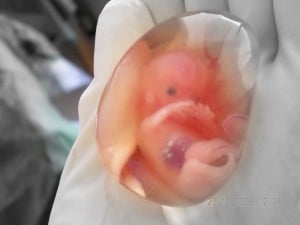 Amid little fanfare, yesterday in the Dag Hammarskjöld Auditorium at the United Nations headquarters in New York, a new document was released to the world. Called the San Jose Articles, the nine-part document has already been called “the most important pro-life document of our time.”
Amid little fanfare, yesterday in the Dag Hammarskjöld Auditorium at the United Nations headquarters in New York, a new document was released to the world. Called the San Jose Articles, the nine-part document has already been called “the most important pro-life document of our time.”
The San Jose Articles begin simply, strongly, effectively:
As a matter of scientific fact, a new human life begins at conception.
U.N. officials and liberal American intellectuals have, in recent years, repeatedly told foreign governments that they must, under international law, liberalize their abortion laws. The CEDAW Committee (Convention on the Elimination of All Forms of Discrimination Against Women), which provides oversight for the international committee on women’s rights, has interpreted some international documents to include abortion as a “right.” Just recently, the U.N. Special Rapporteur on Health issued a report to the Secretary General asserting that such a right exists under the “right to health.”
Many governments—particularly those in nations which are dependent on international aid—have been swayed by the U.N.’s political pressure to relax protections for the unborn.
- In Colombia, based on the statements of a U.N. committee, the high court struck down that country’s abortion laws.
- In Mexico, two high court judges have expressed support for the U.N.’s skewed view of the “right to abortion.”
- The African Union (AU), under pressure from U.N. agencies and non-governmental organizations, extended the controversial Maputo Plan of Action for an additional five years and expanded a new initiative called the Campaign on Accelerated Reduction on Maternal Mortality in Africa. Despite early recommendations to focus on issues such as skilled birth attendants and emergency obstetric care, U.N. Population Fund director Thoraya Obaid instead focused on “unsafe abortion,” “reproductive rights,” “reproductive health services” and “sexuality education.”
The prejudice of the U.N.’s pro-abortion forces extends most particularly to Catholic countries such as Nicaragua, where the pressure to reject Church teaching and concede to U.N. demands is great.
The San Jose Articles clarify, however, that any interpretation of the U.N. Charter which suggests that abortion is a “right” is only an opinion, not a legal fact. In fact, the document says, “There exists no right to abortion under international law, either by way of treaty obligation or under customary international law. No United Nations treaty can accurately be cited as establishing or recognizing a right to abortion.”
Read more here.
Conversely, Article 5 of the San Jose Articles explains, the international treaty on the Rights of the Child specifically states that “the child, by reason of his physical and mental immaturity, needs special safeguards and care, including appropriate legal protection, before as well as after birth.” (The U.S. has not ratified this treaty, because of a concern for parental rights.)
Article 7 of the San Jose Articles points out that “treaty monitoring bodies have no authority, either under the treaties that created them or under general international law, to interpret these treaties in ways that create new state obligations or that alter the substance of the treaties.”
The San Jose Articles were introduced at the U.N. by Professor Robert George of Princeton and former U.S. Ambassador Grover Joseph Rees. Among the 29 esteemed signatories to the Articles were Professor John Finnis of Oxford; Professor John Haldane of the University of St. Andrews; Francisco Tatad, the former majority leader of the Philippine Senate; Javier Borrego, former judge of the European Court of Human Rights, and Professor Carter Snead of UNESCO’s international committee on bioethics.
This new initiative reintroduces strong legal logic in defense of unborn life, and gives pro-life nations an important tool to insist that the protections currently extended to mothers and unborn children in their countries should be continued.
For more information on the San Jose Articles, read here.












